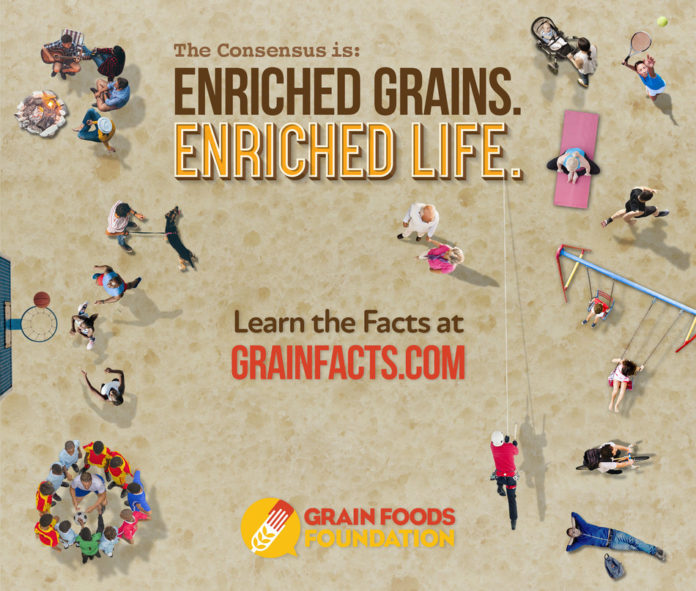
Review of data highlights benefits of consumption, need for continued research and improved messaging
April 14, 2021 – Washington, DC – A new study recently published in Current Developments in Nutrition, a peer-reviewed medical journal of nutritional science, highlights the importance of including refined grains as part of a healthy diet – and, more importantly, the risks of excluding this dietary staple that Americans may not fully understand.
The study, “Do Refined Grains Have a Place in a Healthy Dietary Pattern: Perspectives from an Expert Panel Consensus Meeting,” was undertaken to broaden understanding of the contributions of not just whole grains, but also refined grains, to the American diet. Refined grains are enriched to replace the nutrients that are lost when the bran and germ of the grain are removed during the milling process. These enriched refined grains are often also fortified with several critical nutrients that many Americans under consume. By reviewing scientific data published since the release of the 2015-2020 Dietary Guidelines for Americans (DGAs) on nutrient intakes, diet quality, enrichment and fortification, and associations with weight-related outcomes, panel experts unanimously concluded that not including sufficient refined grain foods in the diet can have unintended consequences.
“This study provides clear support to the message of the 2015-2020 DGAs and that of the recently-released 2020-2025 DGAs: whole and enriched grain foods play an essential role in a healthy diet,” says award-winning child nutrition expert and study co-author Dayle Hayes, MS, RD. “Moreover, it reminds us of the nutrition-related health risks of eliminating or reducing grain foods from diets, at any age, and the need to better convey this message to the public.”
The expert panel issued eleven individual consensus statements related to the benefits of including and risks of excluding grain foods from the diet; health outcomes; dietary guidance; and areas for future research. In summary, their conclusions included:
- Grain Foods’ Contributions to Nutrient Intake
Whole and refined grain foods such as ready-to-eat cereals, breads, rolls, and tortillas contribute shortfall nutrients and meaningful nutrient density and adequacy to the diets of both children and adults. - Risks of Eliminating Grain Foods
Removing either whole and refined grain foods from the diet can exacerbate nutrient inadequacies and results in more children and adults falling below recommended nutrient intakes as identified by the 2015–2020 Dietary Guidelines for Americans. - Health Outcomes
Available scientific evidence from observational studies does not support the notion that refined grain consumption is linked to an increased risk of becoming overweight or obese. - Dietary Guidance
Evolving dietary guidance should evaluate emerging grains research and offer clarity to help consumers choose and include refined grain foods. Many enriched grain foods serve as “staples” in several healthy dietary patterns and form the basis of nutritious meals every day from breakfast to dinner, with a healthy snack or two between. There is room, as well, for more “indulgent” grain foods in many healthy dietary patterns; these indulgent grain foods are often more energy-dense and can be enjoyed occasionally. - Future Research
Future dietary pattern-focused research should further distinguish between different types of grains by going beyond just “whole” and “refined,” potentially creating an additional classification that separates refined grains (i.e., breads and cereals from cakes, cookies, and pies) when assessing nutrient intake, diet quality, and health-related outcomes between “staple” and “indulgent” choices.
Taking a broad look at the science, the panel concluded that Americans should be careful not to take current “make-half-your-grains-whole” guidance from the U.S. Dietary Guidelines Advisory Committee to mean that their six daily servings of grain foods should not include refined or enriched grain foods. Rather, Americans should seek half of their daily grain servings from whole grains while not neglecting the other half: three refined grain servings.
“The key takeaway of this review is that Americans need to know the many benefits of including both whole grain and refined grain foods in their diets, while also understanding what types of grain foods – what I like to call ‘indulgent grain foods’ – to limit,” said Glenn Gaesser, PhD. and a coauthor of the study. “Make-half-your-grains-whole dietary guidance has been based on decades of studies that focus on dietary patterns, rather than specific food groups, but the rare research that does consider different types of refined grains, shows that they are far from being the ‘bad guy.’”
“Make-half-your-grains-whole messaging dominates, and is indeed essential, but it’s worrisome that enriched grain messaging seems to have been lost,” echoes Sylvia Klinger, a registered dietitian nutritionist and member of the Scientific Advisory Board of the Grain Foods Foundation. “Refined grain foods that have been fortified to help to alleviate shortfalls of nutrients including B-vitamins, thiamin, niacin, riboflavin, iron, and folic acid, which has played a huge role in preventing neural tube birth defects. With this in mind, clearer guidance is needed to help Americans include refined grains as part of the recommended six daily servings for the most comprehensive nutritional benefit grains can offer.” In summary, enriched staple grains are key contributors to nutrition quality in the American diet. Rather than exclude or reduce all “refined grains,” we should be providing clear education for the “other half” of the grain recommendation in the diets for Americans by including the role of staple enriched grain foods.
Preparation of the manuscript of the study, which can be found here, was supported in part by a grant from the Grain Foods Foundation.
The Grain Foods Foundation provided funding support for this research. For more information about the research findings, and to learn more about grain foods’ role in a healthful diet, please visit GrainFacts.com.
# # #
About The Grain Foods Foundation
Formed in 2004, The Grain Foods Foundation (GFF) is a group of thought leaders and advocates for all grain foods and believes everybody needs grain food to enjoy a happy and healthy life. Committed to nutrition education programming that is firmly rooted in science, GFF is a strong advocate for our members and a resource for consumers and the media who want to learn more about the role of grains in a well-balanced eating pattern. GFF offers research-based information and resources to members, partners, influencers, policymakers and consumers through a comprehensive communications campaign, conferences, webinars, research tools, social media and more. GFF is committed to bringing fact-based information and common sense to the consumer. For more information, visit www.GrainFoodsFoundation.org.







